
Education Programming with PcERC by Hannah Ikong
![]() Cairdeas
Cairdeas
![]() 1st July 2022
1st July 2022
Hello! Allow me to introduce myself; my name is Hannah Ikong and in March I joined the Palliative care Education and Research Consortium (PcERC) as an Education Programming Consultant. I have experience in both education and administration in Uganda, the UK, and the USA, and I am delighted to provide support to our most recent education programmes. This year has been marked by growth in the educational programmes; namely, an expansion of our medical student resources (i.e., the MMed Family Medicine Expert Lectures) and a rebirth of the Palliative Care Fellowship Programme.
The MMed Family Medicine Expert Lectures are a response to the learning needs of the Makerere University family medicine (general practitioner) students. Postgraduate students often have clinical instructional rotations in different specialities, including palliative care, at the end of their course. The most recent rotation during March 2022 spurred us to create an expert lecture series addressing the primary medicine approach to palliative care. Through the partnership of palliative care specialists around the globe, engaging 30-minute lectures were recorded, designed for group discussions and immediate application in clinical rounds. Topics surrounding complete healthcare worker participation and hospital-specific set up of palliative care and perspectives on palliative care in global, rural, and fragile settings were covered. The students were inspired to incorporate palliative care in their own daily practice. The expert lectures are now being organised and saved for future family medicine students on a private YouTube channel (watch our playlists here).
We are also in the thick of building a Palliative Care Fellowship Programme, which will be the first of its kind in Sub-Saharan Africa (SSA). Our plan is to start the Fellowship in Uganda and later branch to other countries under the ambit of the East, Central and Southern Africa College of Physicians (ECSACOP). We are delighted to have partnerships to support the Fellowship through Cairdeas IPCT, members of the Royal College of Physicians of Edinburgh and London and members of the Association for Palliative Medicine, UK. The Fellowship planning has been a process with monthly steering group meetings since March 2022 of both Ugandan and UK palliative care experts, while we have benchmarked and wrote a curriculum, structured a proposal, submitted the work for senior review, and investigated routes of accreditation. We must note and thank the ongoing collaboration of several palliative care specialists in and outside Uganda, led by Dr Mhoira Leng, Dr Elizabeth (Liz) Namukaya, and Dr Kate Howorth (six-month UK volunteer with PcERC).
As we reflect on both the tasks accomplished and remaining, one word comes to mind: collaboration. Palliative care specialists across the globe have provided their expertise and time to create the MMed Family Medicine Expert Lectures, and others are continuing to support in the Fellowship’s Programme creation and approval. We also have excellent support for the Department of Medicine and Family Medicine at Makerere. We are so grateful for the teamwork and passion being invested in palliative care education. We look forward to outcomes of improved clinical skills and research, and improved access to palliative care in communities around Uganda and beyond. We also invite further collaboration from those interested in palliative care education programming; for enquiries, please contact me, Hannah Ikong at hikong256@gmail.com.
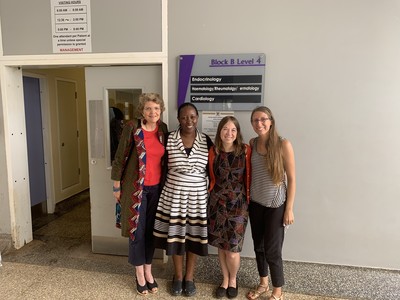
Some of our Palliative Care Fellowship steering group members at Mulago Hospital; (from left to right) Prof Julia Downing, Dr Liz Namuwkaya, Dr Kate Howorth, and Hannah Ikong.
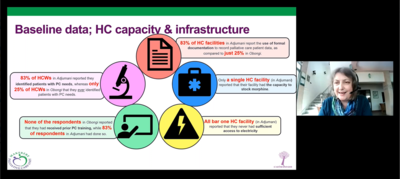
Sceenshot of an expert lecture for the Family Medicine students, hosted by Dr Mhoira Leng.
My father passed away in Pain but not in Vain: Reflections on Palliative Care from a Neurorehabilitation & Pain Medicine Consultant
![]() Cairdeas
Cairdeas
![]() 17th June 2022
17th June 2022
by Dr Khamis Elessi
“Life can only be understood backwards; but it must be lived forwards.” –Soren Kierkegard
2010 was the turning point in my life, I was an energetic, focused and well known specialist of Neurorehabilitation & Pain, successfully treated and helped thousands of severely injured patients and people with disabilities, for more than 10 years I chaired the biggest medical rehabilitation team in Palestine.
I have cared for chaired the medical rehabilitation team at Elwafa medical Rehabilitation Hospital in Gaza city, Palestine for 13 years, provided consultations for patients with strokes, head injury, and spinal cord injury with the goal of returning patients to normal or near-normal activities as quickly and safely as possible, I focused on maximizing patient’s function and optimizing quality of life through a thorough assessment and a comprehensive rehabilitation and pain-relief plan.
But at the beginning of 2010, My late father started to suffer from difficulty swallowing and was later diagnosed with adenocarcinoma of the lower third of the esophagus with no Metastatic lesions, he was advised by many consultants to undergo surgery in an advanced center and since we don't have any such center in the Palestinian territories, we opted to referring him to an advanced Israeli hospital in Tel-Aviv and unfortunately, I was not given a permission to accompany him, so my mother who is just a house wife was the only option to join him.
After he underwent the surgery successfully, He spoke to me the next day crying of severe pain all over the chest and back and that he can't breathe well and he was crying for some analgesics, so I have tried many times to speak to the doctors in charge in that hospital and trying to convince them that my dad is suffering and he is craving for pain medications, but they always insisted that they know what the best for him.
With the persistent of the complaints from my dad and the ignoring from the other side, he started to develop chest infections and later renal impairment, few days later, they have decided to insert a jejunostomy tube for feeding which mistakenly pass the correct location and penetrated it into the peritoneal cavity which led to peritonitis and later renal failure which unfortunately ended by death father.
The news of death left me in shock, it was the most traumatic and dramatic event I have ever experience in my life, but that same catastrophic event left me thinking of the thousands of helpless patients with cancer, organ failure, cardiac problems and incurable disease and left suffering alone with their families in a daily basis inside our hospital and in their homes.
This has forced me to make a turning point in my life and career and that encourage me to stat an initiative in the Gaza strip to promote and integrate the principles and skills of palliative care and pain management to all doctors, nurses and medical students.
From a medical and ethical perspective, every person has the right to live and die with dignity, I started the journey and faced the bitter and the sweet, I set myself on a path to implement and improve palliative care.
In Gaza Strip, which is a tiny piece of land along the Mediterranean with more than 2.2 million individuals (more that 75% of them are refuges with limited electricity and water supply and they are unable to secure the cost of their medications) and with a protracted siege for the last 15 years and repeated wars and aggressions with Israel that has left thousands killed and tens of thousands injured and left with disabilities or intolerable pain and sufferings, the implementation of the palliative care program has been challenging and full of obstacles. There is lack of knowledge, attitudes and practice and furthermore no strong analgesics for people with cancer and other pathologies such as advanced heart, lung and kidney diseases.
Since then till now, I have not stop organizing and conducting tens of workshops and training days in this new field of mine. But in 2015, this initiative took and strong boost from my elegant friend Dr. Liz Grant when I discussed my work with her and asked for her support and she nominated the world-renowned Dr. Mhoira Leng who has made a massive input and together we have amazing achievements.
My first initiative was to promote palliative care and comprehensive pain management in 2011n through 2015 our workshops which targeted around 300 among doctors and health professionals from different hospitals. Such new knowledge was positively reflected on the lives of thousands of needy patients.
From 2014-2021, together with consultants from the UK, I started with developing and implementing a special module for pain and palliative care for medical students in the Islamic University of Gaza. We then organized 10 workshops for more doctors and health professionals to encourage adoption and integration of palliative care concepts into the medical curriculum and practice
In January, 2018, I have started a series of lectures and training sessions to the medical staff of the main paediatric oncology hospital in Gaza which was culminated by the creation of the first palliative care team including psychologist and spiritual healers to directly serve cancer patients. The patients’ feedback was very encouraging and motivational for me to go further.
On, the 25th -26th of October 2018, we organized the 1st international conference in Palestine on “Pain management & palliative care in Palestine”. It was attended by more than 500 doctors and health professionals including consultants from the USA, Norway, Britain, Uganda and Japan.
In February-March of this year (2022), I have spent more than a month in one of the biggest centers in the middle east King Hussain Cancer Center (KHCC) which specializes in cancer and palliative care. The main purpose of my visit was to have in-site actual application of palliative care in a modern facility; to exchange knowledge about how best to apply and overcome obstacles, to strengthen our joint collaboration in the field of mutual patient care and palliative care and finally to boost our joint teaching and training potentials to kick start the designed Palliative Care Diploma program for Gaza health professionals. The visit, hosted by Dr Omar Shamieh, has achieved all planned objectives and more and the learnt knowledge and experiences have been and still being disseminated among more and more health professionals in the Gaza Strip. This trip was kindly funded by the CairdeasIPCT traveling Fellows scholarship programme. I am truly grateful for their kindness and generosity.
In short, the demise of my lovely father in pain was a big loss for me, for my family and for many people who loved him and still but, what I am sure of is that my Dad’s death was not in vain as it has changed my perception of holistic patient care and led me to start a series of workshops, training courses, and an international conference and later integrate this unique health service in 2 of our major hospitals in the besieged Gaza strip. This new service has and will still benefit thousands of patients, their families, the doctors and care givers.
Finally without the indispensable role of Mhoira Leng, Liz Grant, Colin Copper, Denis Rutovitz and Graham Watt as well as the kind support from CairdeasIPCT, I wouldn't be able to accomplish of these achievements and materialize my dreams on the ground.
Dr Khamis Elessi: MD, Board certified in PM&R, MSc in EBHC, DipAcu, and DipPain & Palliative care.
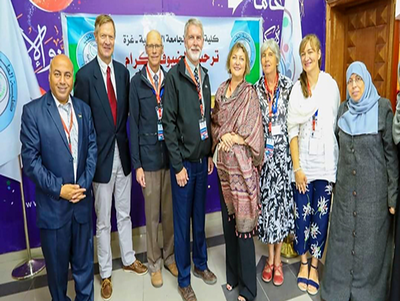
Pain and palliative care 2018 conference
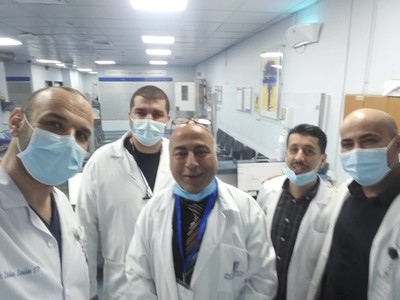
Clinical rounds in KKCH, Jordan
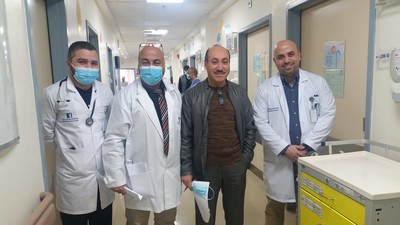
Colleagues in KHCC, Jordan
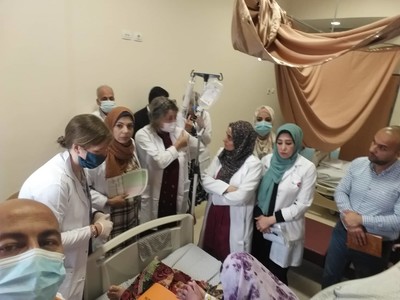
Clinical rounds in the TPFH, Gaza with the UK team
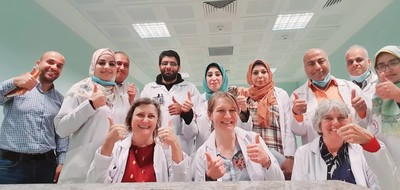
New palliative care team at TPFH, Gaza...ready to make a difference
Palliative care trainings in Adjumani and Obongi districts, 2021-2022
![]() Cairdeas
Cairdeas
![]() 21st April 2022
21st April 2022
Carried out for the project Transform. Empowering communities and health systems to address health related suffering in host and humanitarian settings through capacity building and integration funded by UKAid.
The project provides capacity among community health workers and family care givers in South Sudanese refuge settlements and host communities in rural Uganda through training 472 health care providers to be able to improve care to 16,800 patients and families through improved identification of chronic disease and palliative care needs, effective referral processes within the health system, community mobilisation and empowerment.
It is a 24 months project running from the 1st February 2021-31st January 2023, and to-date we have completed our training activities.
Faculty:
We have a team of trainers that includes faculty from Cairdeas IPCT, Palliative Care Education and Research Consortium (PcERC) and Peace Hospice Adjumani (PEACHOA) who have developed and prepared materials for all the trainings courses.
As of today, we have trained;
• 52 Heath Care workers: From both Adjumani and Obongi districts in basic palliative care skills so they are able to improve their competencies in palliative care skills and provision of generalist palliative care. The cadres included; doctors, clinical officers, pharmacy technicians, nurses from different health facilities, who will then be able to offer PC to those that need it.
• 301 Family Care Givers: From both Adjumani and Obongi, who will be able to provide support and care to those who need Palliative Care (PC) in the community, through basic nursing care, communication and self-care of the caregivers.
• 100 Village Health Teams trained and given skills to be able to identify persons with a chronic illness and give appropriate referrals for care and treatment.
• 22 VHTs trained as expert mentors, to be able to support and mentor other VHTs, these have been given each a mobile phone and additional training in photovoice; a methodology of data collection that we will use to collect data through lived experiences of these VHTs.
• 20 HCWs trained as expert mentors to be able to mentor others as well as support PC implementation in their facilities.
Some of the challenges that we have faced have included:
• Delays due to COVID-19 and travel restrictions from the government, team members affected as well as at sites where training was to be done.
• Flooding of the Nile delayed activities for Obongi as travel to this area was not possible.
• Increased costs of activities due to the COVID-19 pandemic
We have however had some lessons along the way which will help us implement better programs in future.
• Importance of flexibility and planning for unexpected events
• Importance of working with implementers who are familiar with the environment has been helpful.
• Involving local leadership (opinion leaders, health and political leaders) as it creates ownership and support for the programmes amongst the community.
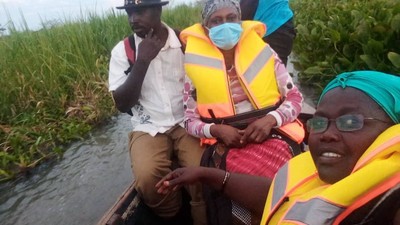
The training team crossing over from Adjumani to Obongi after the Nile flooded
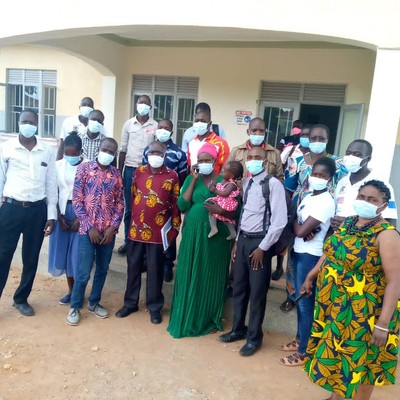
Trainers and Participants and the Health Care Workers training in Obongi district
